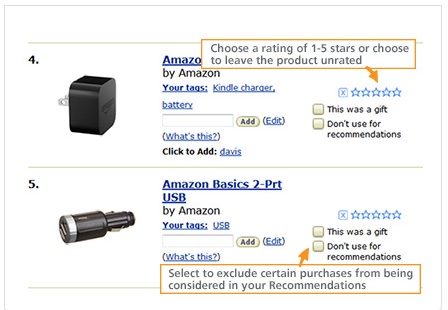 I’ve been a big fan of Amazon’s recommendation engine. Because, well, Amazon. And recommendations. However, these days I seem to be getting reminded constantly of its limitations. I keep getting hit up by recommendation emails from Amazon that are based on a one-time-only search, for stuff that I would never want to look at another time. Yet Amazon serves them up to me.
I’ve been a big fan of Amazon’s recommendation engine. Because, well, Amazon. And recommendations. However, these days I seem to be getting reminded constantly of its limitations. I keep getting hit up by recommendation emails from Amazon that are based on a one-time-only search, for stuff that I would never want to look at another time. Yet Amazon serves them up to me.
For instance, I did a search for Teleread for Chromebits on Amazon. I looked at the Amazon Fire TV stick, once. I have never bought a single piece of Amazon hardware. Yet Amazon has just sent me a “Based on your recent visit, we thought you might be interested in these items” email with a Fire TV stick and accessories, none of which I will ever buy. Seems like a great way to make no sale and piss off your customer. If this is a demonstration of actual modern AI at work, Skynet could never have made it out of the bunker.
Of course, I could turn off such emails, except I still appreciate those times when Amazon does recommend something worth seeing. Yet time and again, it seems to be serving up no-brain spam.
If this is how things go, I don’t know why any marketing mavens even try to pretend that the AI or algorithms behind Amazon’s recommendation platform are so powerful or so mysterious. Too often, it only seems as clever as your last visit or search. Surely it can’t be that hard to tweak the AI to recommend based on number of past purchases or visits, etc? Especially since Amazon supposedly keeps all your data on file.
Yes, Amazon does have an “Improve Your Recommendations” page, where you can tweak your recommendations settings yourself. But how many users will bother to do that? The whole point of this platform is surely that customers should not have to do anything, and that Amazon’s AI will just learn by observation. At this rate, though, traditional retailers, and especially independent bookstores, can breathe a sigh of relief. They’ll always have a role, through intelligent dialog with, and understanding of, their customers. Both of which seem lacking at Amazon, however formidable its rep.
Another perspective: Amazon advertising misfires are not as silly as they seem, by Chris Meadows.




























